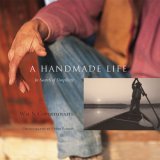In A Handmade Life (read a general review here), Bill Coperthwaite promotes a different view of education. If education is more of an apprenticeship than a discipleship, if it allows the innate enthusiasm of children for the unknown to run its natural course, and if it acknowledges the value of nature, then children and, by extension, society, will be happier and smarter. But first and foremost, Coperthwaite points out that such an education would not yet be complete without a context of home and community and a deep-seated feeling of usefulness.
-
Home and community
Coperthwaite deplores the sequestering of the young in centers of learning (from daycare to college). Wouldn’t their education would be so much more complete, and relevant for their futures, if they were immersed into the community of adults again. Simply put: “Do you want better doctors? Improve kindergarten,†or rather, abolish it altogether!
Coperthwaite writes that “the home is the center of education and emotional security… a school is no substituteâ€. But he is not your average proponent of homeschooling (or unschooling): the home where schooling needs to take place needs to change.
What is missing from our homes is variety. We should enrich our nuclear families with the elderly, who have so much to offer in terms of experience, stories and time. Extending the family also means adding layers of personality and ways of dealing with problems. And it is important that every member of the family is valued for his or her usefulness. “Every child has a right to a family with a purpose,†he writes, and purpose entails work.
-
Usefulness and work
The best kind of work is physical work, what Coperthwaite calls bread labor. It includes raising and preparing food, making shelter and clothing, caring for children.
Children in our “civilized†societies rarely get to witness that kind of vital labor, or any work, for that matter. In the morning they and their parents go off in opposite directions: school and the office, shop or farm. When children do catch a glimpse of “work,†it is often as a negative: a stressful activity that adults rarely enjoy, something to be avoided.
This is shame and a crime, Coperthwaite finds. Children should get to participate in bread work again. But before we squirm at the thought of child labor, he makes it plain that that is not what he has in mind. Rather, young people, even small children, can be useful and indeed draw a lot of self-confidence and pride from their usefulness. Moreover, engaging in this kind of work will restore to them a sense of the value of the meat on their plate and the clothes on their backs.
-
Homemaking
For Coperthwaite, homemaking is “the most important profession and can be the most exciting of all.†He is a homemaker himself – he built his home, makes his supper, washes his clothes (by hand).
He is also childless, but he is not without insight into children, or without the regular company of children. Going by the many anecdotes about children, and Peter Forbes’ pictures in the book, it is company in which both he and the child thrive.
A Handmade Life, In Search of Simplicity, by William S. Copethwaite and with photographs by Peter Forbes is published by Chelsea Green Publishers (ISBN 1933392479).

Mmmmm…This feels just right. Makes me think of the comment Lori had posted the other day. Did you read it?
You must live in your school. Your house and land you live on must be the school. You are always the teacher and always the student. You must do everything possible to educate yourself about life, the world, yourself, and most importantly, the connections between everything. You must have many people visit the school, and much solitude and silence to reflect on things. You must start this school now. It must be your life. — James Neill, 30 June, 2001
Regardless of where “school” is, it is always at home. When we think about how we are growing with our children we should draw more from the history of home centered living..where home provides for us in all ways: physical, spiritual, and educational.
I look forward to reading this book one day, when the nightstand is free.
Brynn that is a beautiful quote, isn’t it? it should be in everyone’s home, for the kids as well as the adults.